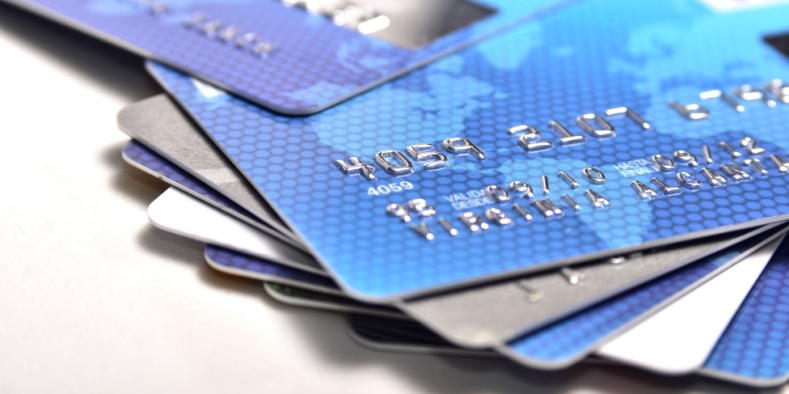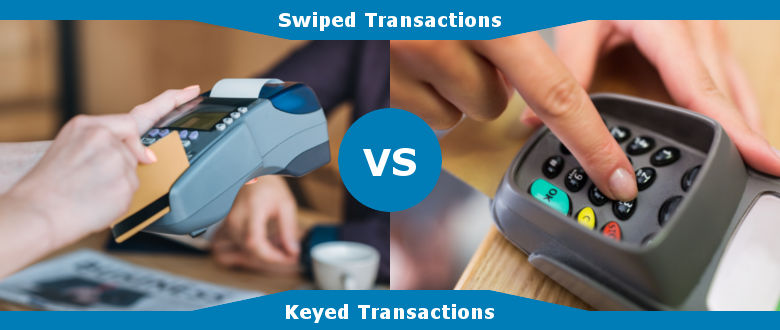As credit and debit card transactions continue to take up a greater share of all transactions, merchants need to think hard about how they accept these transactions and the equipment they use to process them. Differing methods of accepting payment have differing strengths and weaknesses and may also have differing costs. Smart businessmen and women will carefully evaluate their credit card merchant service options.
Swiped Vs. Keyed Card Payments
Businesses partner with merchant account service providers to help accept and process card payment transactions. These companies provide businesses with a type of bank account that is set up to accept payment from credit or debit card issuers. The merchant account service provider may also provide the equipment used to process these transactions, or the equipment may be provided by a third party. For the services they provide, credit card merchant services will charge fees or take a portion of each sale.
Fees charged to businesses for card payments typically consist of three elements:
- The interchange fee that goes to the bank issuing the credit, debit, or pre-paid card.
- Assessments that go to the credit card network, such as Visa, MasterCard, Discover, etc.
- Processor fees that go to the company facilitating the transaction.
Merchants taking card-based payments need devices capable of processing the information on a credit, debit, or prepaid card and transmitting it to a credit card company or bank to facilitate payment. Devices used to accept card payments typically accept either swiped card transactions, keyed-in transactions, or both. Which application a business will use will largely depend on the nature of the business and an evaluation of the benefits of each format. In general, swiped transactions cost less than keyed transactions to businesses in terms of fees. For some businesses, keyed transactions are their only option, however.
We Also Offer High Risk Merchant Accounts
Merchant services for businesses deemed “too risky” to offer services to. We approve industries that get declined and closed by other providers. With over 15 partnering banks, we have made it our goal to become experts in your industry and find suitable and sustainable sources for your business to process. To learn more about our high risk credit card processing, review our in-depth page here: high risk merchant accounts, or give us a call at (800)993-6300.
Benefits of Swiped Transactions
In a swiped transaction, a customer or sales associate will swipe the customer’s credit or debit card through a payment terminal. The device will recognize the card and begin the process of requesting payment from the card issuer – be it a bank or a credit card company. Swiped transactions have a number of benefits, including:
- Accuracy – Swiped transactions do not pose the risk of human error with regard to a mis-keyed credit or debit card number.
- Speed – Because the consumer is not waiting on a human to look at the numbers and type them into a keypad, transactions typically move at a faster pace with swiped transactions. Problems with cards or equipment may cut into the speed advantage, however.
- Security – Swiped transactions are at a lower risk of fraud than keyed transactions. Consumers who have stolen other people’s credit card information can key in that data to make fraudulent purchases. Unscrupulous sales staff can memorize or otherwise record a customer’s card numbers. According to the Federal Reserve, the number of unauthorized transactions – essentially third-party fraud – was 31.1 million in 2012 and accounted for about $6.1 billion in losses. According to the Federal Reserve, transactions where the card was not present had three times the rate of fraud as card-present transactions.
- Less expensive – Credit card merchant services typically charge businesses less money for swiped transactions than keyed transactions. The perceived risk of fraud causes the higher fees, as fraudulent transactions often result in a charge back to the credit card company.
Benefits of Keyed Transactions
While on the surface it may seem that swiped transactions are the best, keyed transactions also have a number of benefits that may appeal to businesses:
- Reliability – A common problem with swiped payments is that worn cards or faulty processing devices may cause failures in reading the card data. In a keyed transaction, the card information is manually keyed in, making card recognition unnecessary.
- Convenience – Internet businesses and some others may not make face-to-face sales with their customers, making keyed-in transactions the most convenient method of taking payment for goods and services.
Which One to Choose
Companies that will be only accepting keyed-in transactions, such as online stores or businesses that do most of their transactions via phone, would do best to choose a card-not-present merchant account. While the base fees from credit card merchant services will be higher than those of a swiped account, they won’t be as high as surcharges to transactions made on a swipe account for card-not-present transactions. Retail stores with physical locations would do better to use swipe transactions and urge sales associates to avoid using keyed-in transactions.
A Card-Based Marketplace
According to the 2013 Federal Reserve Payments Study, card-based payments are rapidly becoming more common. Checks are being squeezed out as more payments are made via card, and even cash payments are dwindling as credit and debit card use becomes more common. Consumers made more than 122 billion credit and debit card transactions worth about $79 trillion in 2012. Between 2003 and 2012, the number of non-cash payments increased at an annual rate of 4.7 percent between 2003 and 2012.
Debit card payments appear to be the card payment of choice among consumers. Debit card payments grew by a greater rate than any other payment type between 2009 and 2012. Pre-paid cards are also rising in popularity, with transactions increasing by 3.3 billion between 2009 and 2012.
Cash remains an important part of the marketplace, particularly for small-dollar transactions, but card payments are whittling down cash’s share of all transactions. The rising use of payment processing devices that connect to smartphones or mobile devices will likely accelerate this trend, as small transactions once only available via cash are now capable of being made using credit, debit, or pre-paid cards.
The Bottom Line
Card payments are here to stay and merchants need to make smart decisions about the credit card processing services they use to maximize customer convenience and minimize fees and surcharges. Leap Payments provides a variety of merchant account options to businesses at competitive rates. A well-established credit card processing service, Leap Payments can help its clients reliably process card-based payments at rates they can afford.
Sources:
https://www.yahoo.com/news/us-debit-cards-market-increased-000000884.html
http://paysimple.com/blog/2011/09/09/who-wants-to-talk-about-credit-card-processing-rates-on-a-friday/
http://www.us-banks.net/merchantservices/types.html
Save time shopping around for the best credit card processing provider!
Call Leap Payments at (800) 993-6300 Today!
High Risk Accounts, The Lowest Rates, No Hidden Fees, and Much More!






